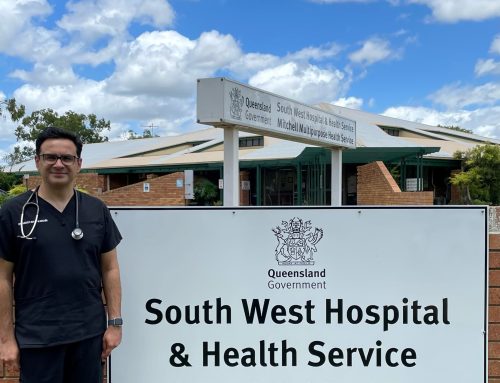Emerald is the hub of the Central Highlands and home to a busy rural birthing service that serves the community and hospital staff alike. In the last four years, thirteen doctors have taken parental leave from Emerald Hospital and five of these doctors took maternity leave twice during that time. We asked Emerald mums and QRGP Fellows Dr Jackie Holloway and Dr Nikki Harch, to share their experiences on returning to work after parental leave, highlight some of the challenges in navigating the return to work, and offer some helpful tips to help make the transition as smooth as possible.
Preparing for that first day back
The process of transitioning back to work from parental leave can be a challenge, and you need to make sure that you’re ready to go back before making that decision.
There has been a lot of focus on supporting the return to work for breastfeeding mothers with the 2023 International Breastfeeding Week theme of, “enabling breastfeeding – making a difference for working parents”, but breastfeeding is only one of the challenges faced by rural medical parents returning to work.
As a parent you go from thinking about car seats, capsules, bouncers, bassinets, bottles, nappy bags, contemplating spending ‘THAT’ much money on a Snoo (fancy ba$$inet)- to then thinking about returning to work. “How do I adapt my previous work routine to my new reality of working whilst raising a child?!
Parental leave can cause challenges for rostering, especially within rural communities where workforce shortage exists and childcare options and family support may be limited. As much as everyone involved would love to alleviate that strain, there are many factors to consider when returning from extended leave, including how to maintain skills in procedural practice.
What the research says
A review of surgical trainees unsurprisingly found that when procedural skills are part of everyday practice, trainees felt significant pressure to return to work quickly, to avoid de-skilling. The review found that over sixty percent of respondents felt they needed to return from leave before six months postpartum and admitted to lower confidence on their return to work, with approximately forty percent feeling like it took them over six months to return to their usual working capacity.1
Respondents in another study described low confidence in their skills and concerns about possible knowledge loss from time out of the workforce, causing clinical mistakes, as well as uncertainty around currency of practice and guidelines that were released during their period of leave.2
Further research found that less than half of the study respondents had any discussion with management about return to work plans following time off. Concerns around management support and the ability to undergo training or supernumerary positions before returning to usual duties were barriers.3
A 2022 review found an association with decreased anxiety around return to work when official policies are in place that could be referenced regarding parental leave and return to work, but that policies should leave room for flexibility and individualisation.4
Navigating the barriers
One of the barriers with returning to work after parental leave is childcare, or lack thereof within rural communities. Factors to consider include availability of childcare, roster hours outside of childcare hours, as well as the expenses associated with childcare whether it be a day care facility or nanny.
Other factors to consider include plans for feeding your baby, whether it be direct breastfeeding or pumping in the workplace and fatigue considerations if you are working night shifts and need to regularly feed your baby throughout the day.
As Rural Generalists, the ability to upskill or attend professional development courses within our local communities can be impossible at times. This means relocating to attend upskilling or courses and factoring in childcare during this period. This might mean bringing someone to care for your child with you which brings extra costs.
There may also be situations that now bring along personal triggers and are more confronting than prior to parental leave, such as managing a sick child or a neonatal resuscitation. This, however, can be difficult to prepare for.
Breastfeeding and expressing challenges
For parents who are breastfeeding, this adds a layer of complexity returning to work. In Queensland, the MOCA6 has included lactation breaks and the Australian anti-discrimination laws state that a workplace cannot refuse a reasonable request for breaks to pump breast milk. Several studies have shown that returning to work is a common reason that women cease breastfeeding. Given that the WHO recommends breastfeeding up until the age of 2, there are lots of benefits to helping breastfeeding mothers continue breastfeeding while they return to work. Beyond having access to lactation breaks, you also need access to a private area to breastfeed or pump, a fridge to store milk, breast pump parts, as well as a sink to rinse pump parts.
Top tips for continuing breastfeeding/ pumping when returning to work:
- If you have Facebook – join the MMAMTB lactation interest group – there is a wealth of knowledge available.
- Schedule breastfeeding/ pumping into the day (frequent regular removal of milk will help maintain supply).
- Breast pumps only need a rinse after each use during the day, saving the more time-consuming cleaning until later on. Rinse the pump and store it in the fridge between uses.
- Consider a hands-free pump.
Tips for success
For those who are approaching the time to return to work after a period of extended parental leave, we hope the following tips and recommendations can assist in a smooth transition:
- Have a meeting with your Director of Medical Services (DMS) or Medical Superintendent prior to returning to work:
- Discuss roster requirements and the need for flexible rostering around childcare.
- Consider what FTE you will return to work at if it’s not going to be the same as prior to taking leave.
- Advise them if you will be taking lactation breaks and discuss suitable areas/rooms that can be utilised.
- Discuss the possibility of starting work during a weekday rather than weekend, being able to start on a non-clinical shift or supernumerary shift.
- Discuss having additional supports available for first on-call shifts or other potential shifts where you are most isolated.
- Ideally, have someone such as a mentor that has been through a similar process that you can touch base with during this period of time.
- Consider the systems that support you. Is your indemnity up to date (and did you get a discount when you were on leave?). Have you looked at the MOPPS recently, and are you up to date with your professional development?
From personal experience, the first few weeks and months back at work are challenging, so having a strategy in place is helpful. If you are feeling overwhelmed at the idea of going back to work, or are finding the transition more difficult than expected, please reach out to talk to someone and see what additional supports can be put in place. We want a healthy and invigorated workforce that can continue to serve their communities for the long term, so support from colleagues and administrative staff is important.
References:
- Mohan H, Ali O, Gokani V, McGoldrick C, Smitham P, Fitzgerald JEF, Harries R. Surgical trainees’ experience of pregnancy, maternity and paternity leave: a cross-sectional study, Postgraduate Medical Journal, 2019:95(1128),552-7, https://doi.org/10.1136/postgradmedj-2018-135952
- Brightwell A, Minson S, Ward A, Fertleman C. Returning to clinical training after maternity leave. BMJ 2013;347:f5965 https://doi.org/10.1136/bmj.f5965
- Nowak M, Naude M, Thomas G. Sustaining career through maternity leave, Aust J Lab Eco Bentley, 2012: 15(3), 201–216 https://search.informit.org/doi/10.3316/ielapa.261367243853647
- Champaloux EP, Acosta AS, Gray ST, Meyer TK, Bergmark RW. Otolaryngology residents’ experiences of pregnancy and return to work: A multisite qualitative study. Laryngoscope Investigative Otolaryngology. 2022; 7(5): 1322-1328. doi:1002/lio2.878
Dr Jackie Holloway & Dr Nikki Harch | Rural Generalists, Emerald








